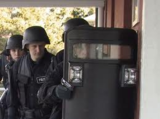Not bad, but it could've been better

Big week at the Supreme Court; after not handing down a decision in a month, the Court comes down with nine opinions in a holiday-shortened week, almost doubling its total for the year. No fewer than six had some criminal implications, including one on double jeopardy and one on whether the decision in Padilla v. Kentucky, about an attorney's obligation to advise a non-citizen client on the immigration consequences of a guilty plea, could be applied retroactively. Yesterday, we discussed the Court's decision in Florida v. Harris regarding drug-sniffing dogs, so we'll keep with the 4th Amendment theme. Today, we'll talk about Bailey v. U.S., which answers a question I'm sure has crossed your mind repeatedly: "If I get wind the cops are coming to search my house and I decide to skedaddle, how far do I have get before they can't stop me just based on the warrant?"
The quick facts: as the cops were preparing to execute a search warrant for Bailey's apartment, they saw him and another male leave the apartment, get into a car, and drive off. They followed him for about a mile, pulled him, and put him in cuffs, telling him it was incident to the execution of the warrant.
The quick law: Back in 1981, the Court had held in Michigan v. Summers that officers could detain the occupants of premises that were being searched. We've talked about "bright lines" in 4th Amendment law -- the desire of courts to drain the swamp of search and seizure law by clearly delineating what is and is not permitted where at all possible -- and here was another one. The right to detain was categorical; it didn't depend on any quantum of proof that the detainee was doing anything other than occupying a place on the time-space continuum which put him in those premises at that precise moment.
Of course, you develop one bright line, and things get muddled someplace else. In this case, it was "occupy." Sure, if you're in the house, that's an easy call, but what if you're walking out while the cops are walking in? What if you're walking down the street in front of the house?
The problem for the government was that whatever line, bright or dim, was to be drawn as to the definition of "occupy," being a mile away from the premises was on the far side of that line. Kennedy's opinion for the majority looked at the three interests the Summers court had found to justify a detention -- officer safety, facilitating the completion of the search, and preventing flight -- and decided that the situation in Bailey didn't measure up for any of them.
Scalia's concurring opinion goes farther. He argues that you don't even get into analysis of the factors in Summers, because Summers doesn't apply: it's limited to "occupants," persons within "the immediate vicinity of the premises to be searched." I think his analysis is better than Kennedy's, and certainly more favorable to defendants. The majority takes pains to point out that Bailey was unaware of the police presence. Two of the Summers factors, officer safety and preventing flight, might have come out differently if there was an indication that he was aware of the impending search.
One could argue that whatever their journey, Kennedy and Scalia arrive at the same destination. The key words to take away from Bailey are these: "Once an individual has left the immediate vicinity of a premises to be searched, detentions must be justified" by something other than Summers. The problem is that Scalia's analysis draws a bright line -- you're either in or out -- and Kennedy's does not. Go back to Bailey's awareness of the police presence. Under the majority opinion, that's a factor you can consider. Under Scalia's analysis, it isn't: Summers doesn't apply at all, and the government has to advance some other justification.
Interestingly, the district court had done just that. Besides concluding that the stop was permissible under Summers because the police had made it "as soon as practicable," the district court also found that it was a proper Terry investigative stop. That issue wasn't addressed by the 2nd Circuit; it affirmed only under Summers.
There's probably good reason that nobody pressed the Terry aspect further, because whatever the justification for the stop, the ensuing events -- the handcuffing of Bailey, searching him and finding a key to the apartment being searched, taking him back to the scene -- went far beyond the level of intrusion permitted by Terry. And the stop itself was obviously based on nothing more than the fact that a search warrant had been issued. That's not going to cut it; deciding that the issuance of a search warrant for a particular premises creates a reasonable suspicion that the owner of that premises is engaging in criminal activity regardless of where he is would justify the detention of a suspect at his workplace thirty miles from his house. On the other hand, the warrant, coupled with something else, might be sufficient to justify the stop. If the police have a warrant for drugs, for example, and see the defendant loading a duffel bag into his trunk, that might provide a sufficient basis for an investigative stop.
Anytime this Court issues a pro-defendant 4th Amendment decision, it's a good day, and I don't want to appear to be looking a gift horse in the mouth. But Bailey could have clearly established a categorical rule that a search warrant doesn't give the police the right to detain anyone outside the vicinity of the premises. It didn't; there's a bit of play there for the facts to enter into it.
Comments